According the the old maxim, those who refuse to learn from history are doomed to repeat it. Assuming that’s true, a quick look at US foreign policy over the last forty years or so suggests at least one lesson we can learn. In that period, the US government often gave backing to questionable men as “lesser evil” allies of convenience, only to be bitten later by these men when the political climate suddenly changed. Noriega worked for the CIA. The Reagan administration gave financial, intelligence and military support to Saddam Hussein against Iran. The CIA funded and trained the people who became the Taliban to fight the Soviets. Since the current administration contains many of the same people who adopted and executed these policies, it’s a good bet that the future thorn in the side of the US is someone we’re currently cuddling up to while (supposedly) holding our nose.
From where might such a thorn grow and who might he be? Looking at numbers for total aid or even just official military aid may help, but past “backfires” were usually done in secret, so it is tough to say for certain who the US is really aiding at the moment. Still much of this is either reported or widely suspected, so some possibilities, in no particular order:
Middle East
The Middle East seems like an obvious place for the thorn (or thorns) to arise, especially since it is the site of the more recent such troublemakers. On the other hand, the US already has so many enemies there, we’re running out of candidates for turncoats. There are a few, though, especially since the US is losing the propaganda war there so badly that it doesn’t even know it is fighting one. (Hint: start with food.) The most obvious candidate for the US being betrayed in the future by those they are backing now is one of their more recent partners:
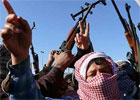 Sunni dissidents
are now being
armed by the US to fight against al-Qaida in Iraq. While on the
surface, this seems like a boneheaded repetition of the mistakes made
with the Taliban, there are a few differences (which may make it a
better move, or even worse). One is that Sunni also may be
receiving arms from Iran. Since Iran’s regime is Shi’a, this seems a
bit odd, but perhaps they assume that anyone willing to resist the US in
Iraq is worth befriending (i.e. they are making the same mistake in
arming potential turncoats as the US). If this is true, the US effort to
arm the Sunni may be more of a “better they get guns from us than them”
move, attempting to point them at other targets. (Is that better?
Worse?) Another difference is that authority to negotiate arms deals has
been given to officers on the ground, not secret CIA operatives.
(Better? Worse?) In any case, I can’t find any references to situations
where dumping a lot of guns into an area experiencing heated religious
strife and wrath against a foreign occupier ever helped much, so this
seems like a good candidate for some future backlash. Photo
by Xinhua/AFP Photo
Sunni dissidents
are now being
armed by the US to fight against al-Qaida in Iraq. While on the
surface, this seems like a boneheaded repetition of the mistakes made
with the Taliban, there are a few differences (which may make it a
better move, or even worse). One is that Sunni also may be
receiving arms from Iran. Since Iran’s regime is Shi’a, this seems a
bit odd, but perhaps they assume that anyone willing to resist the US in
Iraq is worth befriending (i.e. they are making the same mistake in
arming potential turncoats as the US). If this is true, the US effort to
arm the Sunni may be more of a “better they get guns from us than them”
move, attempting to point them at other targets. (Is that better?
Worse?) Another difference is that authority to negotiate arms deals has
been given to officers on the ground, not secret CIA operatives.
(Better? Worse?) In any case, I can’t find any references to situations
where dumping a lot of guns into an area experiencing heated religious
strife and wrath against a foreign occupier ever helped much, so this
seems like a good candidate for some future backlash. Photo
by Xinhua/AFP Photo
 The House of
Saud presents a much different set of possible “backfire”
threats. It is clear that Saudi Arabia has received
official aid from the US and the House of Saud has ties with the Bush family, suggesting
that unofficial aid is not out of the question as well. Three types of
backlash seem possible. First, given the number of Saudi Arabian
citizens involved in the 9-11 attack, it’s not clear how loyal the House
of Saud is already. At the very least, a perception against them now
exists, which may snowball
into an official souring against them from the US, which would really
give the House no choice but to turn against America. A second threat is
that the House of Saud is very
large, which makes it unlikely that all members share the same
opinions of the US and provides lots of opportunities for infighting and
coup. A “wrong” king seizing power could change everything quickly.
Thirdly, should the House fall, the US would be confronted with a
situation somewhat like that of Iran in the 1970’s, when the Shah fell.
While the House of Saud is nowhere near as propped up by the US as the
Shah was, the US has more to loose in Saudi Arabia than they did in
1970’s Iran. Photo
by BBC Television
The House of
Saud presents a much different set of possible “backfire”
threats. It is clear that Saudi Arabia has received
official aid from the US and the House of Saud has ties with the Bush family, suggesting
that unofficial aid is not out of the question as well. Three types of
backlash seem possible. First, given the number of Saudi Arabian
citizens involved in the 9-11 attack, it’s not clear how loyal the House
of Saud is already. At the very least, a perception against them now
exists, which may snowball
into an official souring against them from the US, which would really
give the House no choice but to turn against America. A second threat is
that the House of Saud is very
large, which makes it unlikely that all members share the same
opinions of the US and provides lots of opportunities for infighting and
coup. A “wrong” king seizing power could change everything quickly.
Thirdly, should the House fall, the US would be confronted with a
situation somewhat like that of Iran in the 1970’s, when the Shah fell.
While the House of Saud is nowhere near as propped up by the US as the
Shah was, the US has more to loose in Saudi Arabia than they did in
1970’s Iran. Photo
by BBC Television
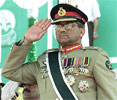 Pervez
Musharraf, dictator of Pakistan,
most closely fits the historical “type” of leader that ultimately turns
on his US backers. Clearly a key ally in current US involvement in the
Middle East, it is not so clear how loyal an ally Pakistan actually is.
Pakistan is repeatedly
accused of harboring terrorists, and signed
a truce with the Taliban. Islamists in Pakistan are becoming
more vocal and it appears that Musharraf may
be starting to loose political standing. That’s a dangerous
situation for a leader that might turn against the US to be in, as he
may think he could boost his following by reversing course. Taking the
danger to a whole new level, he controls nuclear weapons.
Photo by
Reuters
Pervez
Musharraf, dictator of Pakistan,
most closely fits the historical “type” of leader that ultimately turns
on his US backers. Clearly a key ally in current US involvement in the
Middle East, it is not so clear how loyal an ally Pakistan actually is.
Pakistan is repeatedly
accused of harboring terrorists, and signed
a truce with the Taliban. Islamists in Pakistan are becoming
more vocal and it appears that Musharraf may
be starting to loose political standing. That’s a dangerous
situation for a leader that might turn against the US to be in, as he
may think he could boost his following by reversing course. Taking the
danger to a whole new level, he controls nuclear weapons.
Photo by
Reuters
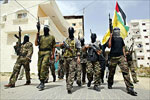 Fatah, being an
arm of the Palestinian
Liberation Organization (PLO), would seem an odd horse for the US to
back; however, they fight Hamas, who wants to wipe
Israel off the map. It is unlikely, however, that Fatah will emerge as
the next big “turncoat” enemy. They are being trounced
by Hamas, so probably will not survive long enough to betray
American backers. It is likely, however, that the US will continue to
back any anti-Hamas groups it can find, and some of those may eventually
succeed in eliminating Hamas, only to rise against the hand that fed
them. Even Fatah itself, should it survive, can be counted on for
betrayal. Already, as Michael Oren says in the Wall Street
Journal (see previous link), “a distinct correlation exists
between the amount of support that Fatah receives from the West and its
need to prove its ‘Palestinianess’ through terror.” Photo
by AFP
Fatah, being an
arm of the Palestinian
Liberation Organization (PLO), would seem an odd horse for the US to
back; however, they fight Hamas, who wants to wipe
Israel off the map. It is unlikely, however, that Fatah will emerge as
the next big “turncoat” enemy. They are being trounced
by Hamas, so probably will not survive long enough to betray
American backers. It is likely, however, that the US will continue to
back any anti-Hamas groups it can find, and some of those may eventually
succeed in eliminating Hamas, only to rise against the hand that fed
them. Even Fatah itself, should it survive, can be counted on for
betrayal. Already, as Michael Oren says in the Wall Street
Journal (see previous link), “a distinct correlation exists
between the amount of support that Fatah receives from the West and its
need to prove its ‘Palestinianess’ through terror.” Photo
by AFP
Former Soviet states
A number of ex-Soviet (usually ex-KGB) types managed to gain power in the former Soviet states after the collapse of the USSR. Fortunately, the citizens of most of these countries seem to have more sense than the US, as they’ve been overthrowing these Cold-War relics with surprising ease, and almost no blood. Some possibilities, however, remain:
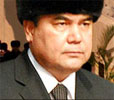 Gurbanguly
Berdymukhammedov, at first glance, isn’t much of a
candidate for this scenario, because the US doesn’t seem to have done
much for or with Turkmenistan, the country who recently “elected” him.
One would like to think the US has stayed away from the country because
it’s former
leader was so odious, but the truth is more likely that they are
more fixated on other nations in the region at the moment. Still, even
if Berdymukhammedov’s regime turns out to be as hard as his name is to
spell, Turkmenistan’s natural-gas
wealth nearly guarantees outsiders will try to make deals with him.
Photo by
?
Gurbanguly
Berdymukhammedov, at first glance, isn’t much of a
candidate for this scenario, because the US doesn’t seem to have done
much for or with Turkmenistan, the country who recently “elected” him.
One would like to think the US has stayed away from the country because
it’s former
leader was so odious, but the truth is more likely that they are
more fixated on other nations in the region at the moment. Still, even
if Berdymukhammedov’s regime turns out to be as hard as his name is to
spell, Turkmenistan’s natural-gas
wealth nearly guarantees outsiders will try to make deals with him.
Photo by
?
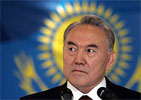 Nursultan
Abishuly Nazarbayev, the current leader of the false democracy of Kazakhstan,
provides a good example of the “dictator masquerading as democrat” that
seems trendy these days. The current US administration seems intent on
cozying
up to him, in spite of typical post-Soviet
thuggery. On the other hand, he evidently gave up huge numbers of
nukes voluntarily (back to Russia) and seems more interested in
playing nice with all sides. If Kazakhstan is a future thorn, it will
probably be under a different leader. His son-in-law was making a bid
for power in 2012, but Nazarbayev fired
him and issued a warrant for his arrest. He also recently changed
laws to allow himself to remain in power indefinitely. Photo by
Associated Press
Nursultan
Abishuly Nazarbayev, the current leader of the false democracy of Kazakhstan,
provides a good example of the “dictator masquerading as democrat” that
seems trendy these days. The current US administration seems intent on
cozying
up to him, in spite of typical post-Soviet
thuggery. On the other hand, he evidently gave up huge numbers of
nukes voluntarily (back to Russia) and seems more interested in
playing nice with all sides. If Kazakhstan is a future thorn, it will
probably be under a different leader. His son-in-law was making a bid
for power in 2012, but Nazarbayev fired
him and issued a warrant for his arrest. He also recently changed
laws to allow himself to remain in power indefinitely. Photo by
Associated Press
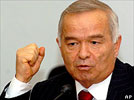 Islam
Karimov, leads Uzbekistan
similarly, but even more overtly dictatorially. The US government liked
him, since he was trying to squash an Islamist rebellion in his country,
but that’s changed since his troops gunned down a
peaceful protest. (Given the fact that this action made the Bush
administration say “woah! too brutal for us! see ya!”, you can
assume it was pretty bad.) At this point, it seems the US already burned
the bridge with Uzbekistan’s regime, which is now purging
itself of pro-American members and cozying up to China and Russia.
It’s possible Karimov might become a thorn, but it’s probably more
likely that the brewing insurrection will succeed, making yet another
Islamist state that hates America. Another possibility is that the growing
rift over which country will dominate the region will grow worse,
creating yet another opportunity for the US to pick the wrong side.
Photo
by Associated Press
Islam
Karimov, leads Uzbekistan
similarly, but even more overtly dictatorially. The US government liked
him, since he was trying to squash an Islamist rebellion in his country,
but that’s changed since his troops gunned down a
peaceful protest. (Given the fact that this action made the Bush
administration say “woah! too brutal for us! see ya!”, you can
assume it was pretty bad.) At this point, it seems the US already burned
the bridge with Uzbekistan’s regime, which is now purging
itself of pro-American members and cozying up to China and Russia.
It’s possible Karimov might become a thorn, but it’s probably more
likely that the brewing insurrection will succeed, making yet another
Islamist state that hates America. Another possibility is that the growing
rift over which country will dominate the region will grow worse,
creating yet another opportunity for the US to pick the wrong side.
Photo
by Associated Press
Africa
Like much of the first world, the historically US has done its share
of meddling in Africa, although to a much lesser extent than, say,
France or England. Recently though, it’s joined the world in ignoring
much of it. While the US has been throwing money at
fighting AIDS promoting abstinence in Africa, it doesn’t
appear to be exercising much political will there lately. Uganda appears
to be on the rise, but it’s not clear it owes much of that to
America. The US concern in Africa now seems not to be famine, genocide
or mineral
wealth, but terrorism.
Which leads us to…
 Meles
Zenawi, Prime Minister of Ethiopia,
has joined
the US war on terror by launching an offensive
against anti-American targets in Somalia and becoming much more involved
in the rest of Africa. Zenawi’s regime has a history mixed messages.
It leads Africa in the percentage of GDP spent on programs for the poor,
but has little
to show for it and a horrible human
rights record. It opens its
airwaves but stifles
freedom of the press. Ethiopia is also surrounded by Muslim
countries, with a growing Muslim population of its own (from 30%-50% of
the country, depending on which source you check). The threat here seems
to be that, as Ethiopia is slowly dragging its way to become more
genuinely democratic, it’s demographics may be shifting. This could
portend an ousting (legitimately or otherwise) of Zenawi, leaving an
American equipped army in the hands of the ousters. Alternatively,
Zenawi may develop visions of granduer from his military outings and
turn feral. Another possibility is that tensions between Egypt and
Ethopia over the water rights of the
Nile could turn ugly, which would put the US in a tight spot.
Photo
by Ethiopian embassy
Meles
Zenawi, Prime Minister of Ethiopia,
has joined
the US war on terror by launching an offensive
against anti-American targets in Somalia and becoming much more involved
in the rest of Africa. Zenawi’s regime has a history mixed messages.
It leads Africa in the percentage of GDP spent on programs for the poor,
but has little
to show for it and a horrible human
rights record. It opens its
airwaves but stifles
freedom of the press. Ethiopia is also surrounded by Muslim
countries, with a growing Muslim population of its own (from 30%-50% of
the country, depending on which source you check). The threat here seems
to be that, as Ethiopia is slowly dragging its way to become more
genuinely democratic, it’s demographics may be shifting. This could
portend an ousting (legitimately or otherwise) of Zenawi, leaving an
American equipped army in the hands of the ousters. Alternatively,
Zenawi may develop visions of granduer from his military outings and
turn feral. Another possibility is that tensions between Egypt and
Ethopia over the water rights of the
Nile could turn ugly, which would put the US in a tight spot.
Photo
by Ethiopian embassy
 Hosni
Mubarak, President of Egypt,
served as a high ranking officer in several wars against Israel before
attaining his current office. During the first Gulf War, he allied his
country strongly with the coalition, Egyptian soldiers being some of the
first to fight in Kuwait. Presently, he is not as
enthusiastic about the Iraq war, but still receives nearly five
times more military aid from America than does all of sub-Saharan Africa
combined. It seems unlikely that Mubarak would rabidly turn on the US,
but if it happens, it will almost certainly be over Israel. As in
Ethiopia, another possibility is that increased democracy could actually
oust him in favor of a more Islamist ruler. Photo
by Khaled Desouki / AFP / Getty
Hosni
Mubarak, President of Egypt,
served as a high ranking officer in several wars against Israel before
attaining his current office. During the first Gulf War, he allied his
country strongly with the coalition, Egyptian soldiers being some of the
first to fight in Kuwait. Presently, he is not as
enthusiastic about the Iraq war, but still receives nearly five
times more military aid from America than does all of sub-Saharan Africa
combined. It seems unlikely that Mubarak would rabidly turn on the US,
but if it happens, it will almost certainly be over Israel. As in
Ethiopia, another possibility is that increased democracy could actually
oust him in favor of a more Islamist ruler. Photo
by Khaled Desouki / AFP / Getty
Other locations
No doubt a number of other people and areas are missing from this list. Thailand? Indonesia? Mexico? What do you think?